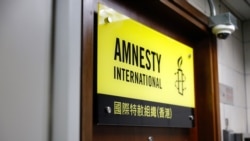Amnesty International announced Monday it would shut its two offices in Hong Kong, citing concerns about the city’s sweeping national security law.
The human rights group has had a presence in Hong Kong for more than 40 years. The group’s mission has been “building awareness of human rights issues in the city.”
The group said will shut its local office by the end of October and its regional office by the end of the year.
The closure comes amid Hong Kong’s rapidly changing political climate under the national security measure.
Following anti-government protests in Hong Kong in 2019, China implemented the national security law for the city. The measure prohibits secession, subversion, terrorism and collusion with foreign forces.
The law has prompted a political crackdown on dissent, with dozens of activists charged under the law. Pro-democracy books have been removed from libraries and schools, with political slogans banned.
The law carries a sentence of life imprisonment, and since its enactment, dozens of pro-democracy activists have been charged, with at least one person jailed. Several of Hong Kong’s local civic organizations and unions have also come under pressure, with many folding.
Anjhula Mya Singh Bais, chair of Amnesty’s international board, said in a news release that Hong Kong’s national security law has made it “impossible” for human rights organizations to work freely and without fear of reprisal from the government.
“It is increasingly difficult for us to keep operating in such an unstable environment,” the statement read.
Amnesty presence in Asia-Pacific
Amnesty has its headquarters in London and boasts 10 million members and supporters worldwide, with operations in more than 70 countries.
The Hong Kong offices have a sister location in Bangkok, and the group continues to conduct research and advocacy work across other countries in the Asia-Pacific region.
When VOA requested further comment from the Hong Kong office, the response was attributed to Kyle Ward, Amnesty deputy secretary-general.
“Amnesty’s offices around the world will continue monitoring and responding to the human rights situation in Hong Kong.
“We are not cutting any roles or resources dedicated to Hong Kong. The Amnesty office in Hong Kong is one part of the Regional Office for East and Southeast Asia and the Pacific, and so the work carried out in Hong Kong will continue as before, from different locations including Bangkok and others in the region.”
Effects of security law
Hong Kong’s space for civic groups has quickly declined in recent months.
Although many of Hong Kong’s civil societies and unions have been around for decades, at least 50 civil society groups have disbanded since the security measure came into force last year, Agence France-Press reported.
After 48 years, Hong Kong’s Professional Teachers Union disbanded after facing heavy criticism from Chinese state media and the Hong Kong government, which claimed the union had mixed education with politics.
The Hong Kong Alliance in Support of Patriotic Democratic Movements of China – known for organizing Hong Kong’s annual vigil in memory of the Tiananmen Square crackdown in Beijing in 1989 – voted to disband in September. Its leaders currently face secession charges under the security policies.
And earlier this month, the Hong Kong Confederations of Trade Unions disbanded over “uncertainty” amid the political climate.
Hong Kong Chief Executive Carrie Lam has previously denied there is a crackdown on civil society.
International reaction
Sari Arho Havren, a China analyst based in Brussels, told VOA that Amnesty’s vacating its Hong Kong offices is concerning.
“Closing Amnesty International’s regional office in Hong Kong is a disturbing sign how civil society in Hong Kong is disappearing and only pro-Beijing yes-voices remain allowed. When an organization such as Amnesty cannot operate anymore, the alarm bells should ring loud in all democracies,” she said.
“When an international, reputable organization such as Amnesty doesn’t feel safe to operate in Hong Kong anymore without fear of reprisals, how could a smaller, less-known NGOs feel safe?” Havren added.
Eric Yan-ho Lai, a law and political analyst and fellow at Georgetown University Law School, told VOA that Amnesty’s closure of its office is “alarming” because of its international status.
“There are more than 50 NGOs, student unions and trade unions disbanded or closes their offices in Hong Kong, but AI (Amnesty International) is more alarming as it's the first international NGO declaring its closure of business in Hong Kong."
"Amnesty International's decision is a vote of no confidence to Hong Kong's rule of law and independent judiciary, in my view,” he added.
The analyst praised the impact Amnesty has made in Hong Kong.
"Amnesty International has done a great job in promoting human rights protections in Hong Kong, including the rights of refugees, asylum seekers and LGBTQs. Their departure implies that even promoting minority rights and non-discrimination in Hong Kong is not safe anymore,” he added.






